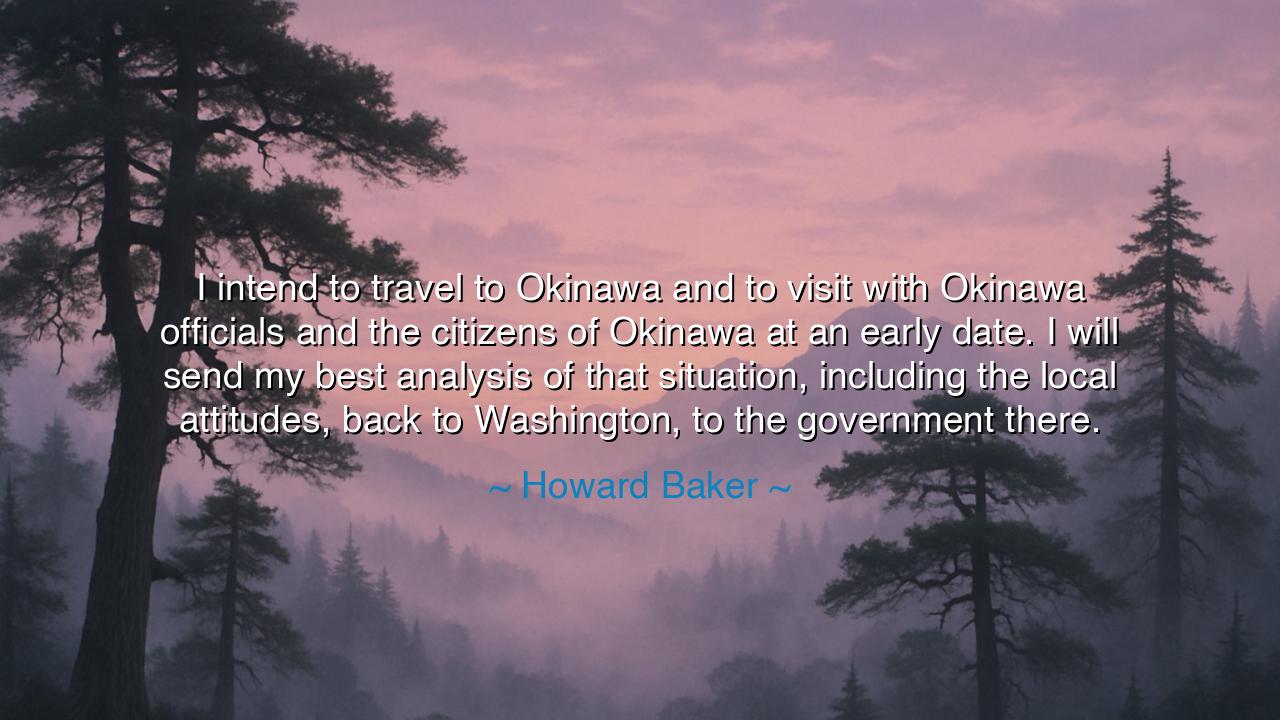
I intend to travel to Okinawa and to visit with Okinawa
I intend to travel to Okinawa and to visit with Okinawa officials and the citizens of Okinawa at an early date. I will send my best analysis of that situation, including the local attitudes, back to Washington, to the government there.






Howard Baker once declared with the sober weight of a statesman: “I intend to travel to Okinawa and to visit with Okinawa officials and the citizens of Okinawa at an early date. I will send my best analysis of that situation, including the local attitudes, back to Washington, to the government there.” These words, though pragmatic in tone, reveal an ancient principle of leadership: that the wise ruler or envoy must not govern from afar, nor speak only from parchment and report, but must see with his own eyes and hear with his own ears. For true judgment is not born of abstraction, but of presence among the people.
The ancients knew this law well. The emperors of China, when wise, sent their ministers to walk among the provinces, to listen to the voices of farmers and merchants, to feel the pulse of the land beyond the palace. In Rome, too, governors were dispatched to distant provinces not merely to enforce decrees but to observe, to learn, and to carry back the truth of local life to the Senate. Baker’s words echo this tradition: his intent was not only to bring orders but to gather understanding, and through understanding, to build trust between peoples.
His focus on Okinawa carries deep significance. That island, scarred by the fiercest battles of the Second World War and later burdened by foreign bases, has long stood at the crossroads of power and suffering. To travel there as a representative of Washington was not simply an act of diplomacy—it was an acknowledgment that history leaves wounds upon people, and that those wounds must be respected if peace is to be nurtured. By vowing to meet with both officials and ordinary citizens, Baker invoked the timeless duty of the mediator: to listen not only to leaders, but to the hearts of the people.
History is filled with examples where such journeys changed the course of nations. Consider the mission of Alexis de Tocqueville, who traveled through America not merely to read laws or statistics but to walk among its citizens, to feel the texture of their lives. His writings, born of direct contact, became immortal because they captured not only the structure of government but the spirit of a people. Baker’s words place him in this lineage of travelers who seek not luxury, but truth—those who move across oceans not to conquer, but to comprehend.
There is a profound humility in his statement: “I will send my best analysis… back to Washington.” He does not claim omniscience before his journey; he acknowledges that wisdom must be gathered through listening. This humility is the mark of the true servant-leader. Too often, rulers presume to know the minds of distant peoples without ever meeting them, and in that presumption, they sow distrust and discord. Baker’s intent reveals that the path of peace is built not upon arrogance but upon attentive presence.
The lesson for us is clear: seek truth at its source. Do not govern your life or your relationships through rumor, hearsay, or assumption. If you wish to understand a person, a place, or a situation, go there, be present, listen with patience, and return with clarity. This is as true for the leader of nations as it is for the parent, the teacher, the friend. Only in presence is trust forged, and only in listening is wisdom gained.
Practically, this means that in our own lives, we must not judge from afar. If conflict arises, meet it face to face. If a matter concerns you, inquire directly from those who live within it. Be wary of voices that speak only from a distance, for distance breeds distortion. Follow Baker’s example: make the journey, however inconvenient, and let your analysis be born of real encounter.
Thus, Howard Baker’s words stand not only as a record of diplomatic intent but as a teaching for all ages: to lead is to travel, to travel is to listen, and to listen is to bring truth back to those who depend on your judgment. The one who refuses this duty rules only in shadow; the one who embraces it brings light to both the governed and the governors alike.






AAdministratorAdministrator
Welcome, honored guests. Please leave a comment, we will respond soon